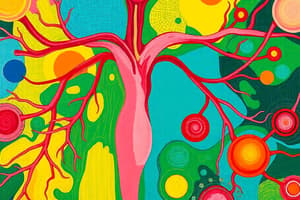Podcast
Questions and Answers
What hormone is secreted by β - cells?
What hormone is secreted by β - cells?
- Insulin (correct)
- Glucagon
- Testosterone
- Estrogen
Which condition is caused by insufficient secretion of insulin?
Which condition is caused by insufficient secretion of insulin?
- Diabetes mellitus (correct)
- Hypoglycemia
- Hyperthyroidism
- Goitre
What hormone is primarily secreted by Leydig cells?
What hormone is primarily secreted by Leydig cells?
- Insulin
- Testosterone (correct)
- Estrogen
- Progesterone
Which hormone is secreted by the pineal gland?
Which hormone is secreted by the pineal gland?
What role does thyrocalcitonin play in the body?
What role does thyrocalcitonin play in the body?
Which gland secretes both T3 and T4 hormones?
Which gland secretes both T3 and T4 hormones?
What characterizes hypothyroidism?
What characterizes hypothyroidism?
What is the primary function of hormones in the body?
What is the primary function of hormones in the body?
What is the primary function of releasing hormones from the hypothalamus?
What is the primary function of releasing hormones from the hypothalamus?
Which statement correctly contrasts hormonal control with nervous control?
Which statement correctly contrasts hormonal control with nervous control?
Which types of glands discharge their secretions directly into the blood?
Which types of glands discharge their secretions directly into the blood?
What disease can result from hyposecretion of the adrenal cortex?
What disease can result from hyposecretion of the adrenal cortex?
What role does aldosterone play in the body?
What role does aldosterone play in the body?
Which type of cells in the pancreas are responsible for secreting glucagon?
Which type of cells in the pancreas are responsible for secreting glucagon?
Which gland secretes catecholamines, including adrenaline?
Which gland secretes catecholamines, including adrenaline?
What characterizes the effects of hormones compared to nervous impulses?
What characterizes the effects of hormones compared to nervous impulses?
What condition is associated with low secretion of growth hormone?
What condition is associated with low secretion of growth hormone?
Which hormone is responsible for milk formation and the growth of the mammary glands?
Which hormone is responsible for milk formation and the growth of the mammary glands?
The hormone responsible for the reabsorption of water from the kidneys is called?
The hormone responsible for the reabsorption of water from the kidneys is called?
Which hormone induces ovulation from Graafian follicles?
Which hormone induces ovulation from Graafian follicles?
What is the primary function of thymosins produced by the thymus gland?
What is the primary function of thymosins produced by the thymus gland?
Which of the following glands is involved in the secretion of hormones that regulate metabolism?
Which of the following glands is involved in the secretion of hormones that regulate metabolism?
Hormones generally have which characteristic regarding their action?
Hormones generally have which characteristic regarding their action?
What role does a feedback mechanism play in hormone regulation?
What role does a feedback mechanism play in hormone regulation?
Flashcards
Hormones
Hormones
Chemical messengers that regulate bodily functions, impacting specific target cells, tissues, and organs.
Endocrine Glands
Endocrine Glands
Glands that release their secretions directly into the bloodstream, without ducts, often called ductless glands.
Exocrine Glands
Exocrine Glands
Glands that release their secretions into ducts, which then carry them to their target area.
Adrenal Medulla
Adrenal Medulla
Signup and view all the flashcards
Adrenal Cortex
Adrenal Cortex
Signup and view all the flashcards
Addison's Disease
Addison's Disease
Signup and view all the flashcards
Cushing's Syndrome
Cushing's Syndrome
Signup and view all the flashcards
Islets of Langerhans
Islets of Langerhans
Signup and view all the flashcards
Dwarfism
Dwarfism
Signup and view all the flashcards
Acromegaly
Acromegaly
Signup and view all the flashcards
Prolactin
Prolactin
Signup and view all the flashcards
Thyroid Stimulating Hormone (TSH)
Thyroid Stimulating Hormone (TSH)
Signup and view all the flashcards
Adrenocorticotrophic Hormone (ACTH)
Adrenocorticotrophic Hormone (ACTH)
Signup and view all the flashcards
Gonadotrophic Hormones
Gonadotrophic Hormones
Signup and view all the flashcards
Oxytocin
Oxytocin
Signup and view all the flashcards
Vasopressin
Vasopressin
Signup and view all the flashcards
Insulin
Insulin
Signup and view all the flashcards
Glucagon
Glucagon
Signup and view all the flashcards
Diabetes Mellitus
Diabetes Mellitus
Signup and view all the flashcards
Hypoglycemia
Hypoglycemia
Signup and view all the flashcards
Testosterone
Testosterone
Signup and view all the flashcards
Estrogen
Estrogen
Signup and view all the flashcards
Progesterone
Progesterone
Signup and view all the flashcards
Hypothalamus
Hypothalamus
Signup and view all the flashcards
Study Notes
Hormones
- Hormones are chemical messengers that regulate physiological processes in living organisms.
- Hormones act on specific target cells, tissues, and organs.
Endocrine Glands
- Endocrine glands secrete hormones directly into the bloodstream.
- Exocrine glands secrete substances into ducts.
- Examples of exocrine glands include salivary glands, sebaceous glands.
- Major endocrine glands include pituitary, pineal, thyroid, adrenal, pancreas, parathyroid, thymus, and gonads.
- Other organs, including the GI tract, liver, kidneys, and heart, also produce hormones.
Differences Between Hormonal and Nervous Control
| Feature | Hormonal Control | Nervous Control |
|---|---|---|
| Transmission | Chemically through blood | Electro-chemically through nerve fibres |
| Speed | Slow | Rapid |
| Target | Different organs | Specific organs |
| Effects of previous experience | Not affected | Affected |
| Duration | Long-lasting and short-lasting | Short-lasting |
Adrenal Glands
- Divided into adrenal medulla and adrenal cortex.
- Adrenal medulla secretes adrenaline (epinephrine) and noradrenaline (norepinephrine), which are called catecholamines (emergency hormones).
- Adrenal cortex secretes corticoids, which include glucocorticoids (regulate carbohydrate metabolism, e.g., cortisol) and mineralocorticoids (regulate sodium and potassium levels, e.g., aldosterone).
Hyposecretion and Hypersecretion
- Hyposecretion: Less secretion from an endocrine gland (e.g., Addison's Disease, insufficient insulin secretion leads to Diabetes Mellitus).
- Hypersecretion: Increased secretion (e.g., Cushing's syndrome, over-secretion of insulin leads to hypoglycemia).
Pancreas
- Islets of Langerhans contain alpha (α) and beta (β) cells.
- Alpha cells secrete glucagon.
- Beta cells secrete insulin.
Testis
- Leydig cells secrete androgens (mainly testosterone).
- Testosterone is involved in spermatogenesis and male secondary sexual characteristics.
Ovary
- Secretes estrogen and progesterone.
- Estrogen develops female secondary sexual characteristics.
- Progesterone affects mammary glands and milk secretion.
Hypothalamus
- Contains neurosecretory cells that produce releasing and inhibiting hormones.
- These hormones regulate the synthesis and secretion of pituitary hormones.
Pineal Gland
- Secretes melatonin which regulates the body's rhythm.
Thyroid Gland
- Secretes tetraiodothyronine (thyroxine, T4) and triiodothyronine (T3).
- Iodine deficiency can lead to hypothyroidism (goiter, cretinism, myxedema).
- High iodine levels can lead to hyperthyroidism (increased metabolic rate).
Parathyroid Gland
- Regulates calcium levels in the blood (increases reabsorption in renal tubules and digested food).
Pituitary Gland
- Divided into adenohypophysis (anterior pituitary) and neurohypophysis (posterior pituitary).
- Anterior pituitary: produces growth hormone, prolactin, thyroid stimulating hormone, adrenocorticotrophic hormone, gonadotrophic hormones (luteinizing hormone and follicle stimulating hormone), and melanocyte-stimulating hormone (MSH)
- Posterior pituitary: produces oxytocin and vasopressin (antidiuretic hormone).
Other Hormones
- Prolactin: Involved in mammary gland growth and milk production.
- Thyroid-stimulating hormone: Stimulates thyroxine secretion.
- Adrenocorticotropic hormone: Stimulates glucocorticoid secretion.
- Gonadotrophic hormones: Regulate gonadal function.
- Melanocyte-stimulating hormone assists in skin pigmentation.
- Oxytocin helps in uterine contraction and milk ejection
- Vasopressin or antidiuretic hormone helps reabsorb water by tubules
- Hyperglycaemia: Increased blood glucose; involves glucagon and diabetes mellitus
- Hypoglycemia: Reduced blood glucose; involves insulin
Characteristics of Hormones
- Act as chemical messengers.
- Secreted by living cells, tissues, or organs (glands).
- Secreted in small quantities.
- Act on specific target sites.
- Generally slow but long-lasting effects.
- Either accelerate or inhibit a reaction.
Studying That Suits You
Use AI to generate personalized quizzes and flashcards to suit your learning preferences.




